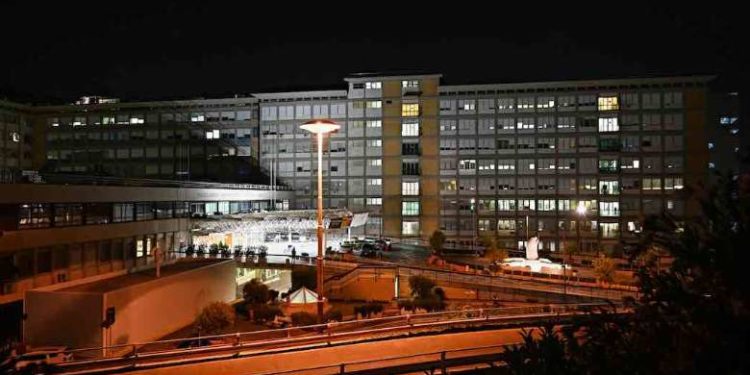Pope Francis was hospitalized July 4 and underwent surgery on his sigmoid colon, the lowest part of the large intestine, the Vatican press office said.
“The Holy Father reacted well to the surgery, which was conducted under general anesthesia,” the press office said in a note issued just before midnight. The statement did not say how long the pope was expected to stay in the hospital, although Italian surgeons interviewed on television said four to five days is normal.
The 84-year-old pope was admitted to Rome’s Gemelli hospital in the afternoon after leading the midday recitation of the Angelus with visitors gathered in St. Peter’s Square.
The pope was to undergo “a scheduled surgical intervention for a symptomatic diverticular stenosis of the colon,” the Vatican press office had said.
Dr. Sergio Alfieri, a staff surgeon at the Gemelli who specializes in surgery of the digestive tract and colon, led the surgery, assisted by a team of surgeons.
Stenosis is a narrowing of a passage in the human body. The Vatican’s description of the pope’s condition indicated a partial blockage of the lower intestine. It provided no information about the cause or suspected cause of the blockage nor of the symptoms the pope had been experiencing.
As soon as the Vatican announced the pope’s hospitalization, get-well messages began being posted on social media.
Italian President Sergio Mattarella, who had just arrived in France when the news broke, sent a telegram, his office said. The president said he and the Italian people were accompanying the pope with “affectionate thoughts” and wishes for a speedy recovery.
Pope Francis has been generally healthy since becoming pope in March 2013 except for recurrent bouts of sciatica, which causes sharp pain that radiates along the path of the sciatic nerve, which branches from the lower back through the hips and down each leg. In late December and early January, he missed several events because the pain was so intense.
The pope also suffered from a pulmonary condition in 1957 at the age of 21 that required him to undergo surgery to remove the upper right lobe of one of his lungs.
In an interview for a book published early in March, the pope said that while his recovery was painful, it was “complete, and I never felt any limitation in my activities.”
“As you have seen, for example, in the various trips I have made and that you have covered, I never had to restrict or cancel any of the scheduled activities. I never experienced fatigue or shortness of breath,” he told Nelson Castro, a physician and Argentina journalist.
The pope also told Castro that when he was the provincial superior of the Jesuits in Argentina, an office he held from 1973 to 1979, he underwent emergency gallbladder surgery.
Credit: Source link




